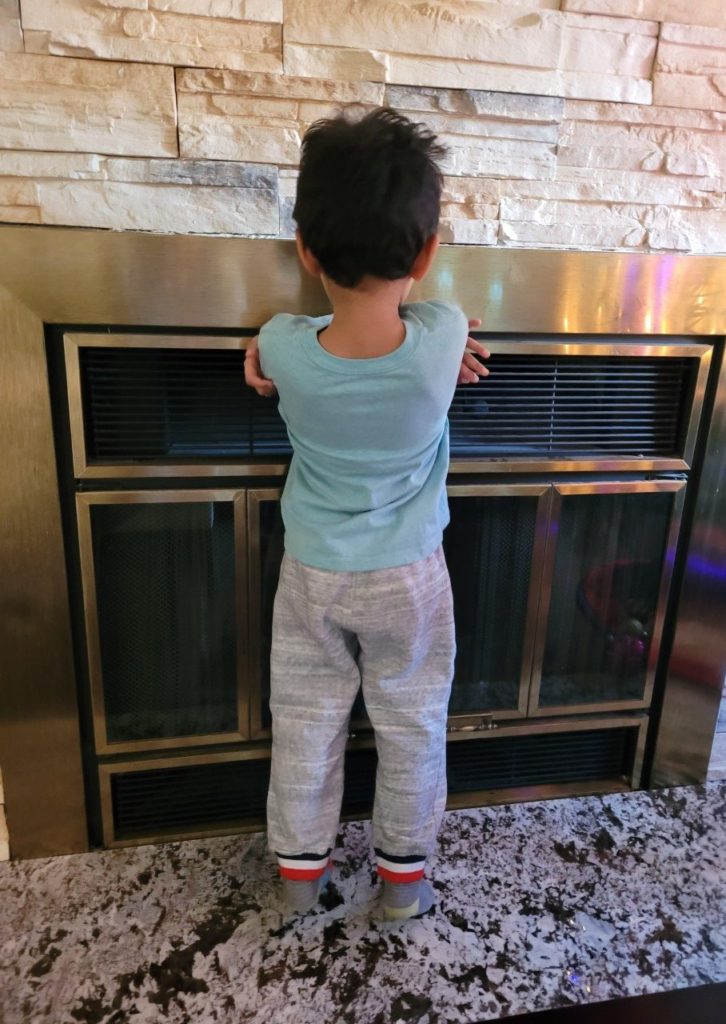My 4 year-old, Jahan, is a rambunctious little guy! He is VERY strong willed, loves to cause trouble and is as stubborn as a mule (but we love him, lol) He doesn’t like to listen to anyone and prefers to be his own boss. It’s very easy to lose patience with him, but when that happens, his behaviour spirals and he won’t give in for the life of him! He also has a tendency to try to talk himself out of any situation. Jahan is my first born, so we had no idea what to expect and no parenting manual on what to do when he started acting out. It was a learning process and in my opinion, parenting is the hardest job on the planet! I want to share with you 6 strategies to deal with strong willed children that have worked well for us.
Practice Positive Parenting
Over the years, the main thing I have learned is leading by example and positive parenting. We need to be the role models to our children – they will mimic the behaviour they see from us. They spend almost all their time with us, literally 24/7 in their infancy and their first few years are the core years of their development. The values they learn now, are what they will carry on in their lives. A quote that I heard that resonated with me was, “it’s easier to raise loving children than to fix broken adults”
Children are sponges, not only do they learn quickly and soak everything up, they also listen to everything that’s being said around them. Even when you think they are distracted doing something else, they are paying attention. They are sensitive to our moods and even if we don’t actually vocalize how we feel, they can sense it from us and pick up on stresses around them. I hope these 6 strategies to deal with strong willed children help you.
1) Be careful with what you say
I remember when Jahan was 3 years old and he was running around the house causing havoc. I pulled him aside and asked why he was acting the way he was and what was causing him to be naughty. He said, ‘it’s just how I am. I am naughty’. I said, ‘no you aren’t, why would you think that’? His response of, ‘I’ve been this way since I was 10 months old’, broke my heart.
I normally say that to my friends and family when we discuss our children. I’d talk about how Jahan was such a great little newborn, so easy, independent, smart etc. Then once he hit 10 months, he would throw his food all over the place, run all over the house (he started walking at 9 months) and never listen – he was so naughty! Cleary, he had heard me recite this story and not only did he hear it, he committed it into his memory and felt that, that was who he was – even at that young age.
Using the word ‘naughty’ is so commonplace, we say it all the time. But it turns out the more we say it, the more our children believe it and the more naughty they will actually become. So rather than telling our children they are naughty, we should address the behaviour as being naughty, not the child. It’s easier to frame it by saying ‘Jahan, please don’t write on the walls, we don’t do that, it isn’t nice. Why are you doing that’?
2) Understand your child’s need for power and control
Children have a need to feel like they have some power. Especially when all they hear are instructions and rules from the adults in their life. A lot of the time, their misbehavior is them trying to get back the control they perceive they don’t have
Give your child choices
Rather than us telling our children what they will be having for snack, or deciding for them, we should give options. An example would be, ‘do you want an apple for snack, or a banana?’ Both options are appropriate and what we would want them to eat (as we are deciding on the options) and by asking them, we are making them feel important
Let your child help out with setting some of the house rules
Coming up with a set of house rules is an exercise you can work on as a family. The children should have an opportunity to set some of the rules too, or at least, be a part of the process and ask questions where they have them. Let them know the set of rules apply to everyone, including the adults, and not just the children
3) Combat Attention Seeking Behaviours
When a child hits themselves, or does something that we as parents freak out over, think – ‘oh my god, he hit himself, he’s going to be aggressive for the rest of his life’ – we need to step back and think about why they are acting like that. I’ve noticed that when I see behaviours like this, it’s when I’m busy on my phone or laptop, when I’m in a conversation with someone else or busy doing something when Jahan is talking to me. He’s feeling like he isn’t getting my full attention. That’s when the bad behaviour sets in, and it only escalates the longer I’m not fully turning my attention to him. He knows when I’m only half listening or when I don’t seem truly engaged, and he will act out.
Take the time for them and listen intently. When they are speaking to you and going on and on and ON about their little stories, show a real interest. Leave the phone in another area and pay attention. That in and of itself, cuts out a lot of the bad behaviour and is a key strategy in dealing with strong willed children. At the end of the day, it’s really little effort to do this one
4) Don’t overexplain
Sometimes we forget that these little beings are just that, little. We can’t talk to toddlers or preschoolers as if they are adults. So we need to stop with the lectures and the overexplaining. Stop for a second and listen to yourself. How would you feel if you were being talked to like that? Especially by someone much bigger than you. Now, add in the component of their age. It’s hard not to preach about what they did, why it was wrong, the impacts it’s had, how it can’t happen again, what you will do next time it happens etc. I’ve caught myself rambling on and by the end of it Jahan would just yell, OKAY! Then I wonder, why is he being aggressive?
Ask questions and discuss feelings
When I changed to asking simple questions and explaining my feelings to Jahan, I found the behaviours subsided and he was much more empathetic:
-
- Ask what caused them to do what they did and listen to their response
- Discuss what they did calmly, with them being an equal participant in the conversation
- Explain why the behaviour hurt and isn’t tolerated
5) Don’t compare your child to others
Whether it’s a sibling, a classmate or a friend, it’s never nice to compare your child’s behaviour to others. But how often do we do this, or see others doing it? ‘Why can’t you be more like Siva, he’s so kind to his parents’, or ‘Why can’t you listen to your teachers like all the other kids in the class’? These may seem to us like innocent little questions but they will leave a scar on these little minds. Our kids will withdraw, feel hurt and start to feel like they are not good enough. Each child is unique and has their amazing strengths and qualities to be recognized. Let’s celebrate those more.
6) Be consistent and make sure everyone who is a major part of your child’s life is onboard
It’s definitely a challenge when you have different parenting styles between the spouses or with the grandparents or caretakers. Make sure that everyone is on the same page on what tactics you are using for discipline and have a united front. Be firm with anyone who doesn’t want to abide by the rules and gently remind them that these are your children so you have the final say
Key Takeaways:
These 6 strategies to deal with strong willed children, have been what I have personally found to work with Jahan. I’ve tried the time outs, the rewarding of good behaviours, the visits to the basement to see ‘Bogeyman’ and withholding treats or taking away favorite toys to get the behavior I wanted to see. I’ve noticed it doesn’t work and if it does it’s short lived. I’m talking like a few minutes. Then we are back to the behaviour. Everything gets drawn out, bedtime takes longer, mealtimes take longer etc. Jahan will want to show his dominance by gaining some control and will act out to get attention. It’s a cycle.
I know parents who swear by time out’s and if it works for you and your child then by all means continue with what works! Every kid reacts differently to different tactics. Jahan would never stay in his time out spot so that didn’t work for us! In the world we are living in today, I believe leading with love and compassion and instilling those qualities in our children will make all the difference.
Do you have children who are at home doing virtual learning? If so, please check out my blog post for some tips to get them comfortable and motivated with distance learning.
What to do if your child needs more support?
There are times when some of the behaviours our children exhibit may warrant more attention and a discussion with your doctor.
The below resources can help for anyone needing additional support or information:
1) Anxiety Canada:
- Some behaviours, such as excessive biting or chewing on things could be used as coping mechanisms and may be anxiety related. www.anxietycanada.com has a section called ‘Anxiety in Children*’ with a slew of resources on what behaviours are considered normal, which are not, how to cope with the behaviours and how to help your child cope
- Your child doesn’t have to be diagnosed with anything, this site can be used for anyone looking for some helpful tips
- This website also provides a lot of content for parents just wanting to help their child with coping with change – such as transitioning to the new normal of virtual learning or mask wearing in schools etc.
- There is a section called MAP (My Anxiety Plan) where you can learn calming strategies and work through a variety of short exercises with your child
- There is also a mindshift App that you can download that has a variety or resources
2) The Rock (Reach Out Center for Kids*):
This is a child and youth mental health agency for Halton region. They offer many services including access to therapists and consultants which are free of charge under OHIP. You can reach out to them for an initial consult and assessment – www.rockonline.ca
*Please note I have not personally used any of these resources – I have heard really good feedback and reviews from friends as well as my pediatrician but I can’t speak first-hand to the experience
3) Books I would recommend:
- ‘How to talk so kids will listen and listen so kids will talk’ by Adele Faber and Elaine Mazlish
- ‘If I have to tell you one more time’ by Amy McCready. She also has some free courses you can attend and an email list you can subscribe to
- ‘1, 2, 3 Magic’ by Thomas W. Phelan (This is about using time outs and disciplining your kids in a way to get them to listen to you. Personally, it did not work for Jahan nor did he take well to the approach so we don’t use it)
- ‘Honey I wrecked the kids’ by Alyson Schafer (recommended by my pediatrician, I have not yet read it, it’s on my to-do list 😊)
What tactics have you used that you found helpful in disciplining your children? Sound off in the comments below!





I really enjoyed your article. My toddler only listens to gentle parenting. If you start to raise your voice he gets worse. But when you talk to him calmly, he stops what he is doing and listens. All kids are different. 🙂
I’m glad you enjoyed the article! You are definetly right, all kids are different. Gentle parenting is great 🙂